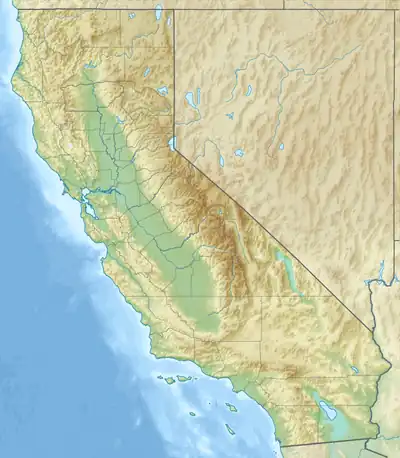| Little Kern River | |
|---|---|
 Location of the Little Kern River in California | |
| Location | |
| Country | United States |
| State | California |
| Physical characteristics | |
| Source | Great Western Divide |
| • location | Sequoia National Forest |
| • coordinates | 36°23′57″N 118°34′19″W / 36.39917°N 118.57194°W[1] |
| • elevation | 10,603 ft (3,232 m) |
| Mouth | Kern River |
• location | Forks of the Kern |
• coordinates | 36°08′00″N 118°26′20″W / 36.13333°N 118.43889°W[1] |
• elevation | 4,790 ft (1,460 m) |
| Length | 24.4 mi (39.3 km)[2] |
| Basin size | 133 sq mi (340 km2)[2] |
| Discharge | |
| • location | Quaking Aspen Camp[3] |
| • average | 131 cu ft/s (3.7 m3/s)[3] |
| • minimum | 7.12 cu ft/s (0.202 m3/s) |
| • maximum | 13,100 cu ft/s (370 m3/s) |
The Little Kern River is a 24.4-mile-long (39.3 km)[2] major tributary of the upper Kern River in the Sequoia National Forest, in the southern Sierra Nevada, California. It is one of three streams, along with Volcano Creek and Golden Trout Creek, that harbor beautiful golden trout (Oncorhynchus mykiss aguabonita).
Watershed and Course
The Little Kern River drains approximately 133 square miles (340 km2) of wilderness,[2] all of it in Tulare County.[1]
The Little Kern begins at Bullfrog Lakes, in the Golden Trout Wilderness south of Farewell Gap near Mineral King.[4] It flows south, past Table Meadow and Burnt Corral Meadows, then enters a deep gorge before it joins with the Kern River at Forks of the Kern.[5] The Little Kern roughly defines the southwest boundary of the Great Western Divide; the confluence with the main Kern (which flows to the east of the range) marks the southernmost tip of the range.[6] Forks of the Kern is located about 40 miles (64 km) upstream of Lake Isabella.[6][7]
Ecology
Major efforts were made since the 1960s to create refuge areas for golden trout in the upper reaches of the South Fork Kern River. Three barriers were built (Ramshaw, Templeton, and Schaeffer) and a piscicide was applied to the river to kill all non-native fish above or between these barriers. From 1969 through 2000, 10 chemical treatments were performed, with varying degrees of success.[8][9]
References
- 1 2 3 "Little Kern River". Geographic Names Information System. United States Geological Survey, United States Department of the Interior. 1981-01-19. Retrieved 2017-10-02.
- 1 2 3 4 "National Hydrography Dataset via National Map Viewer". U.S. Geological Survey. Retrieved 2017-10-02.
- 1 2 "USGS Gage #11185400 Little Kern River near Quaking Aspen Camp, CA". National Water Information System. U.S. Geological Survey. 1957–1969. Retrieved 2017-10-02.
- ↑ United States Geological Survey (USGS). "United States Geological Survey Topographic Map: Mineral King, California quad". TopoQuest. Retrieved 2017-10-02.
- ↑ United States Geological Survey (USGS). "United States Geological Survey Topographic Map: Quinn Peak, California quad". TopoQuest. Retrieved 2017-10-02.
- 1 2 United States Geological Survey (USGS). "United States Geological Survey Topographic Map: Hockett Peak, California quad". TopoQuest. Retrieved 2017-10-02.
- ↑ E. P. (Phil) Pister (2008). Restoration of the California golden trout in the South Fork Kern River Kern Plateau Tulare County California 1966-2004 (Report). California Department of Fish and Game. p. 122. Retrieved March 26, 2020.
- ↑ "Golden Trout Conservation and Management". California Department of Fish and Wildlife. Retrieved March 26, 2020.
- ↑ Stephen J. Stephens; Christy McGuire; Lisa Sims (September 17, 2004). Conservation Assessment and Strategy for the California Golden Trout (Oncorhynchus mykiss aguabonita) Tulare County, California (Report). California Department of Fish and Wildlife. p. 91. Retrieved March 26, 2020.